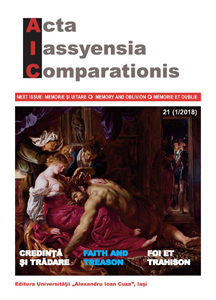Literature’s Loyalty to Betrayal
Literature’s Loyalty to Betrayal
Author(s): Dragoș AvădaneiSubject(s): Comparative Study of Literature
Published by: Editura Universităţii »Alexandru Ioan Cuza« din Iaşi
Keywords: Betrayal; identity; communication; evil; conflict; cognitive dissonance;
Summary/Abstract: This idiosyncratically titled paper is motivated by an attempt to answer the unexpectedly difficult question about betrayal as a fundamental theme or motif in literature—literature in general, from the first known such work, Gilgamesh, through Greek and Roman mythology, fairy tales and folk tales, medieval romances, Dante, Cervantes and Shakespeare, to Goethe, Tolstoy and Joyce, to Anne Sexton and Philip Levine. Our tentative answers: betrayal may represent the fundamental human conflict, as it undermines two of man’s essential claims to existence—identity and communication; evil is more powerful than good; betrayal is a prominent form of cognitive dissonance; and all of these are “illustrated” in five betrayal poems by William Stafford, Anthony Hecht, Frank O’Hara, Anne Sexton, and Philip Levine.
Journal: Acta Iassyensia Comparationis
- Issue Year: 1/2018
- Issue No: 21
- Page Range: 23-31
- Page Count: 9
- Language: English

